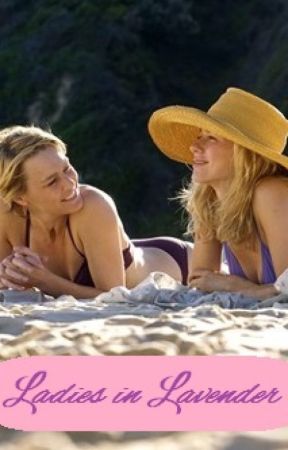A/N - This is Part I of the original story 'Ladies in Lavender' by William J. Locke published in 1919.
I
As soon as the sun rose out of the sea its light streamed through a white-curtained casement window into the whitest and most spotless room you can imagine. It shone upon two little white beds, separated by the width of the floor covered with straw-coloured matting; on white garments neatly folded which lay on white chairs by the side of each bed; on a white enamelled bedroom suite; on the one picture (over the mantel-piece) which adorned the white walls, the enlarged photograph of a white-whiskered, elderly gentleman in naval uniform; and on the white, placid faces of the sleepers.
It awakened Miss Ursula Widdington, who sat up in bed, greeted it with a smile, and forthwith aroused her sister.
"Janet, here's the sun."
Miss Widdington awoke and smiled too.
Now to awake at daybreak with a smile and a childlike delight at the sun when you are over forty-five is a sign of an unruffled conscience and a sweet disposition.
"The first glimpse of it for a week," said Miss Widdington.
"Isn't it strange," said Miss Ursula, "that when we went to sleep the storm was still raging?"
"And now—the sea hasn't gone down yet. Listen."
"The tide's coming in. Let us go out and look at it," cried Miss Ursula, delicately getting out of bed.
"You're so impulsive, Ursula," said Miss Widdington.
She was forty-eight, and three years older than her sister. She could, therefore, smile indulgently at the impetuosity of youth. But she rose and dressed, and presently the two ladies stole out of the silent house.
They had lived there for many years, perched away on top of a projecting cliff on the Cornish coast, midway between sea and sky, like two fairy princesses in an enchanted bit of the world's end, who had grown grey with waiting for the prince who never came. Theirs was the only house on the wind-swept height. Below in the bay on the right of their small headland nestled the tiny fishing village of Trevannic; below, sheer down to the left, lay a little sandy cove, accessible farther on by a narrow gorge that split the majestic stretch of bastioned cliffs. To that little stone weatherbeaten house their father, the white-whiskered gentleman of the portrait, had brought them quite young when he had retired from the navy with a pension and a grievance—an ungrateful country had not made him an admiral—and there, after his death, they had continued to lead their remote and gentle lives, untouched by the happenings of the great world.
The salt-laden wind buffeted them, dashed strands of hair stingingly across their faces and swirled their skirts around them as they leaned over the stout stone parapet their father had built along the edge of the cliff, and drank in the beauty of the morning. The eastern sky was clear of clouds and the eastern sea tossed a fierce silver under the sun and gradually deepened into frosted green, which changed in the west into the deep ocean blue; and the Atlantic heaved and sobbed after its turmoil of the day before. Miss Ursula pointed to the gilt-edged clouds in the west and likened them to angels' thrones, which was a pretty conceit. Miss Widdington derived a suggestion of Pentecostal flames from the golden flashes of the sea-gulls' wings. Then she referred to the appetite they would have for breakfast. To this last observation Miss Ursula did not reply, as she was leaning over the parapet intent on something in the cove below. Presently she clutched her sister's arm.
"Janet, look down there—that black thing—what is it?"
Miss Widdington's gaze followed the pointing finger.

YOU ARE READING
Ladies in Lavender #VisualRetelling #AU
Historical Fiction***FREE STORY***As World War One rages, in the quiet village of Trevannic, a young stranger washes up on the idyllic Cornish shore. His appearance and origins are a mystery. His Greek god muscular good looks and musical genius charms the little vil...
